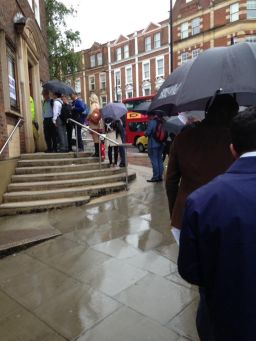Go here to follow CNN’s coverage of the UK referendum live.
Story highlights
NEW: CNN calls the referendum for the Leave campaign
"This is going to be on a knife's edge," said Mark Littlewood of the Institute of Economic Affairs
Final results in the referendum expected Friday after votes are counted in 12 regions
[Breaking news update at 1158 PM ET ]
The United Kingdom has voted to leave the European Union, CNN predicts. Results show the Leave campaign has won with more than 51% of the vote.
[Previous story, published at 1152 PM ET]
The United Kingdom stands on the precipice of a historic move to leave the European Union as a neck-and-neck race appears to have turned in favor of a “leave” vote.
ITV News, a CNN affiliate, and the BBC have called the referendum for “Leave” to win. CNN is not yet predicting the result of the once-in-a-generation vote, which could lead to the UK being the first country to leave the European bloc.
Almost 46.5 million people were registered to vote in Thursday’s referendum.
Leave.EU and UKIP leader Nigel Farage, who had earlier appeared to concede that the “Remain” vote has “edged it, has said that he now believes his campaign would be victorious.
“I now dare to dream that the dawn is coming up on an independent United Kingdom,” he told supporters.
Historian Simon Schama told CNN “I think Leave is going to win this and I think Britain is going to leave the European Union, which obviously I think is a catastrophe.
“We’re on a kind of very dangerous knife edge about the integrity and coherence of Europe. So one of those moments, if this result stays and Britain leaves the union, we’re entering a very dark and exceptionally dangerous period in European and actually world history, too.”
The final, nationwide result is expected to be announced Friday morning.
In one of the most divisive campaigns in recent memory, polls had consistently shown voters split down the middle, with the outcome too close to call, and wavering voters likely to determine the result.
But as results kept coming in overnight, the vote, with 274 of 382 electoral districts reporting, was 51.63% in favor of leaving the EU.
Polls closed at 10 p.m. (5 p.m. ET). As results come in, they will be announced by region. The 12 regions include Scotland, Northern Ireland, Wales, London and eight English regions. Almost 46.5 million people were registered to take part in the historic vote.
The UK has been a member of the European Union (and its precursors) since 1973.
Markets start freaking out
The pound has dipped precipitously in forex markets as results from more and more election authorities come in, slowly solidifying the “Leave” camp’s hold on the referendum.
The pound has dropped below 1.35 against the dollar, the lowest since 1985, according to Kit Juckes, a strategist at Societe Generale.
Early referendum results have sparked a global markets sell-off. London stock futures are trading 7% lower and stock futures in the U.S. are down 2%, CNNMoney reports.
Before the polls closed, markets had been expecting the UK would stay in the EU. But that expectation changed rapidly as results started coming in.
The pound is dropping sharply against all major currencies, and is currently trading at 1.38 against the dollar. Oil is down 4%.
Gold – one asset investors turn to in the times of uncertainty — is up 2%.
Turnout appeared to be heavy, with pro-Leave margins surprising observers. Freddie Sayers, Editor-in-Chief and Chief Digital Officer at British pollster YouGov, told CNN that voters in areas expected to vote for Brexit are doing so in greater numbers than projected.
Littlewood said the UK will have a difficult time moving forward, no matter what the outcome.
“Tomorrow we’ll wake up to a totally divided nation,” he said.
He predicted Scotland and London would vote to Remain and that Wales and the rest of the UK outside London would vote to Leave. The first districts reporting in London, as well as Liverpool, came out strongly in support of Remain.
Full coverage of the UK referendum
In addition to the massive changes that a vote for a Brexit would entail for Britain, observers predict it could also trigger a political crisis, with “Remain” supporter Cameron struggling to control his ruling Conservative Party if he backed the losing side on such a critical issue.
Eighty-four pro-Brexit Conservative MPs have delivered a letter to the British Prime Minister’s office saying that, whatever the result, they believe Cameron has “both a mandate and a duty” to continue in office, Conservative MP Robert Syms said on Twitter.
The letter was organized by Syms and signed by 84 Conservative MPs, two-thirds of whom publicly supported the Vote Leave Campaign, including former Mayor of London Boris Johnson.
Ill portents for ‘remain’ voters?
Britons headed to polling stations beneath rainy skies in London, following torrential rains and thunderstorms overnight that caused flash flooding in parts of the capital and southeastern England.
The downpour wreaked havoc on transport networks in London and southern England and caused two polling stations in southwest London to close and relocate after they were inundated with floodwaters. Others across the capital opened late due to the weather.
Among the key political players casting their votes Thursday were UK Prime Minister David Cameron, who voted at a hall in London; Labour leader Jeremy Corbyn, who also voted in the capital; and Farage, who voted in Westerham, England.
After the polls closed, Cameron tweeted: “Thank you everyone who voted to keep Britain stronger, safer & better off in Europe - and thousands of @StrongerIn campaigners around the UK”
Registered voters include Britons aged over 18 from England, Wales, Scotland, Northern Ireland and Gibraltar – a British territory off the southern coast of Spain. Irish and Commonwealth citizens living in the UK are also eligible to vote.
One of the major groups wanting to leave the EU, Vote Leave, tweeted: “Whatever the outcome, it’s been an incredible campaign. Thank you to everyone who was a part of this! #ProjectHope”
‘Serious consequences’
Turnout in Scotland is 67% and voted overwhelmingly to stay in Europe. Should the UK as a whole determine to leave, many north of the border feel that this would be a catalyst for another Scottish referendum, allowing the country to secede from the UK.
“If this result holds, it’s the end of Britain, just simple as that… Scotland is voting overwhelmingly to stay,” Schama says.
“If Scotland cannot be coerced into leaving the EU against its will, you cannot, in all decency, deny them a second referendum. If all the leavers are about self-government, taking back control, why shouldn’t the Scots take back control?
“Bye-bye Great Britain, bye-bye United Kingdom. That will absolutely happen.”
Turnout in the North East region was about 67% with 7 of its 12 districts reporting. The North East was generally Eurosceptic.
Both turnout figures are about the same as turnout for British general elections – but the Scottish figure is significantly lower than the 85% who turned out to vote in Scotland’s 2014 independence referendum.
‘Out is out’
Cameron negotiated with European leaders this year to secure improved terms of membership in the bloc if Britain stays in the EU.
European Commission President Jean-Claude Juncker warned Wednesday there will be no further renegotiation.
“We have concluded the deal with the Prime Minister; he got the maximum he could receive, and we gave the maximum we could give so there will be no kind of renegotiation,” he said.
“Out is out.”
French President François Hollande also warned that the result would have a huge impact on the future of the European Union.
“The departure of a country that is, geographically, historically, politically in the European Union would have extremely serious consequences,” he said.

Why Brexit vote should worry Trump
Toxic climate
The political climate leading up to the referendum was unusually volatile, with both sides accusing each other of lying and scaremongering.
The tension reached its peak with last week’s killing of Labour MP Jo Cox, a pro-“Remain” advocate in her first term in parliament. She was the first sitting British lawmaker to be killed since 1990.
Her husband, Brendan Cox, told the BBC she had been concerned about politics becoming “too tribal and unthinking.”
“She was very worried that the language was coarsening and people were driven to take more extreme positions,” he said.
On Wednesday, another Labour MP tweeted that she had received a death threat for her referendum campaigning.
Brexit: What will immigration look like if Britain leaves the EU?
The referendum got some attention from a movie star, with Lindsay Lohan, who currently resides in London, offering up her thoughts in a series of tweets. The actress firmly declares her support to “Remain,” shows her support for free trade and express her love for the Shetland Islands.
CNN’s Bryony Jones, Phil Black, Nic Robertson, Richard Allen Greene, Simon Cullen, Sebastian Shukla, Tim Lister, Vasco Cotovio and Anais Furtade contributed to this report.




















